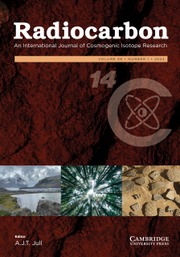Article contents
ADVANCING ANTARCTIC SEDIMENT CHRONOLOGY THROUGH COMBINED RAMPED PYROLYSIS OXIDATION AND PYROLYSIS-GC-MS
Published online by Cambridge University Press: 08 February 2024
Abstract
Radiocarbon (14C) dating of sediment deposition around Antarctica is often challenging due to heterogeneity in sources and ages of organic carbon in the sediment. Chemical and thermochemical techniques have been used to separate organic carbon when microfossils are not present. These techniques generally improve on bulk sediment dates, but they necessitate assumptions about the age spectra of specific molecules or compound classes and about the chemical heterogeneity of thermochemical separations. To address this, the Rafter Radiocarbon Laboratory has established parallel ramped pyrolysis oxidation (RPO) and ramped pyrolysis-gas chromatography-mass spectrometry (Py-GC-MS) systems to thermochemically separate distinct carbon fractions, diagnose the chemical composition of each fraction, and target suitable RPO fractions for radiocarbon dating. Three case studies of sediment taken from locations around Antarctica are presented to demonstrate the implementation of combined RPO-AMS and Py-GC-MS to provide more robust age determination in detrital sediment stratigraphy. These three depositional environments are good examples of analytical and interpretive challenges related to oceanographic conditions, carbon sources, and other factors. Using parallel RPO-AMS and Py-GC-MS analyses, we reduce the number of radiocarbon measurements required, minimize run times, provide context for unexpected 14C ages, and better support interpretations of radiocarbon measurements in the context of environmental reconstruction.
Information
- Type
- Conference Paper
- Information
- Radiocarbon , Volume 66 , Issue 5: 24th Radiocarbon and 10th 14C & Archaeology, Zurich, Sept. 11–16, 2022 Proceedings Part 1 of 2 , October 2024 , pp. 1120 - 1139
- Copyright
- © The Author(s), 2024. Published by Cambridge University Press on behalf of University of Arizona
Footnotes
Selected Papers from the 24th Radiocarbon and 10th Radiocarbon & Archaeology International Conferences, Zurich, Switzerland, 11–16 Sept. 2022
References
REFERENCES
- 5
- Cited by


